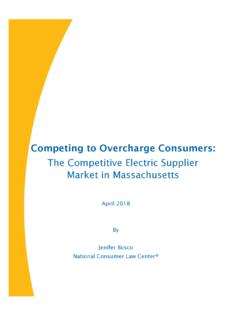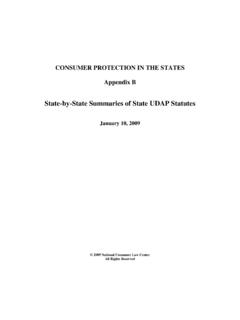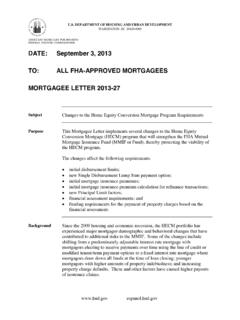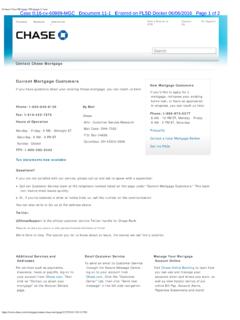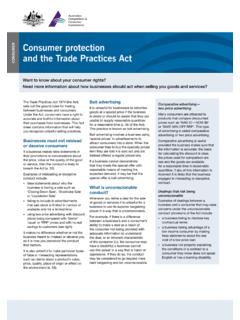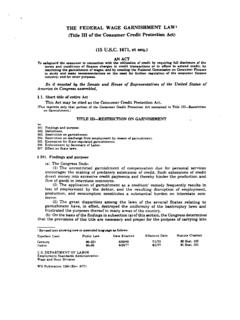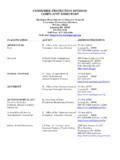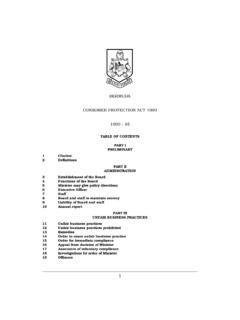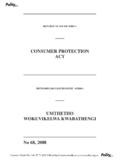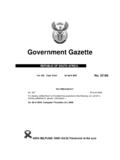Transcription of Paper Statements: An Important Consumer Protection
1 Why Paper Statements: An Important Consumer Protection March 2016. By Chi Chi Wu and Lauren Saunders National Consumer Law Center . Copyright 2016, National Consumer Law Center, Inc. All rights reserved. ABOUT THE AUTHOR. Chi Chi Wu is a staff attorney at the National Consumer Law Center (NCLC) with a focus on Consumer credit issues at NCLC, including legislative, administrative, and other advocacy. Her specialties include fair credit reporting, credit cards, refund anticipation loans, and medical debt. Before joining NCLC, Chi Chi worked in the Consumer Protection Division at the Massachusetts Attorney General's office and the Asian Outreach Unit of Greater Boston Legal Services. Chi Chi is a graduate of Harvard Law School and The Johns Hopkins University. She is co-author of the legal manuals Fair Credit Reporting and Collection Actions, and a contributing author to Consumer Credit Regulation and Truth in Lending.
2 Lauren Saunders is Associate Director at the National Consumer Law Center and manages the Washington, DC office, where she directs NCLC's federal legislative and regulatory work. Lauren is a recognized expert in various areas, including prepaid cards, electronic payments, small dollar loans, credit cards, bank accounts, and Consumer Protection regulation. She contributes to NCLC legal treatises, including Consumer Banking and Payments Law, Consumer Credit Regulation, and Fair Credit Reporting, and has authored several reports and white papers. She previously directed the Federal Rights Project of the National Senior Citizens Law Center;. was Deputy Director of Litigation at Bet Tzedek Legal Services; and was an associate at Hall &. Phillips. She graduated magna cum laude from Harvard Law School and was an Executive Editor of the Harvard Law Review, and holds a Masters in Public Policy from Harvard's Kennedy School of Government and a , Phi Beta Kappa, from Stanford University.
3 ACKNOWLEDGEMENTS. The author would like to thank NCLC colleagues Margot Saunders and Alys Cohen for substantive contributions; Jan Kruse for editorial review; and Cleef Milien and Svetlana Ladan for technical assistance. ABOUT THE NATIONAL Consumer LAW CENTER. Since 1969, the nonprofit National Consumer Law Center (NCLC ) has used its expertise in Consumer law and energy policy to work for Consumer justice and economic security for low- income and other disadvantaged people, including older adults, in the United States. NCLC's expertise includes policy analysis and advocacy; Consumer law and energy publications;. litigation; expert witness services, and training and advice for advocates. NCLC works with nonprofit and legal services organizations, private attorneys, policymakers, and federal and state government and courts across the nation to stop exploitive practices, help financially stressed families build and retain wealth, and advance economic fairness.
4 TABLE OF CONTENTS. 1. WHY ARE STATEMENTS Important ? .. 1. WHY DON'T ELECTRONIC STATEMENTS WORK FOR MANY CONSUMERS? 2. Digital Divide and Limited Internet Resources .. 2. Infographic: The Digital Divide in Home Broadband .. 3. Mobile Access is Not Sufficient .. 4. Lower-Income Families Face Special Barriers .. 5. Even the Computer-Savvy May Prefer Paper .. 5. Paper Makes it More Likely that Consumers Will See Critical Information .. 7. Paper Provides a More Permanent Record .. 8. Paper is Important for Older Consumers and Their Families .. 9. THE CFPB NEEDS TO PROTECT CONSUMERS WHO WANT TO KEEP Paper 10. Federal Consumer Laws Require Financial Institutions to Provide Paper 10. Electronic Statements Cannot be a Default Choice .. 11. Electronic Statements Cannot be a Condition of the Product .. 12. Financial Institutions Should Not be Allowed to Charge a Fee for Paper Statements .. 12. Financial Institutions Should Not Use Deceptive Measures to Force Consumers to Choose.
5 Electronic Statements .. 13. The Carrot is Better than the 14. CONCLUSION: CONSUMERS SHOULD HAVE THE UNFETTERED CHOICE. OF Paper OR ELECTRONIC 15. ENDNOTES .. 16. INTRODUCTION. Electronic statements sound eco-friendly, but they are not for everyone. Bank account, credit card and mortgage statements provide Important information and serve a critical Consumer Protection function. Consumers must have the right to receive that information in the manner that works for them. For many consumers, from those without regular broadband Internet access to the most computer savvy, Paper is a more reliable way of ensuring that the Consumer actually sees the information and can retain Important records. Paper statements must be available for free for consumers who want them, and consumers should not be coerced into electronic statements or steered into them by default if Paper is the Consumer 's first choice. WHY ARE STATEMENTS Important ?
6 Bank account statements serve several Important purposes. They provide a record of the Consumer 's transactions and enable the Consumer to check for unauthorized charges or errors. Statements reveal the fees that the Consumer has been charged, with monthly and year-to-date summaries displayed prominently on the top. Consumers can check statements to ensure that they received proper credit for an item returned or disputed. Statements help consumers balance their accounts and keep track of their finances. They provide a permanent record of the Consumer 's income, expenses, transactions and fees. Statements are used to qualify consumers for a mortgage or other forms of credit. Statements are Important when preparing tax returns and when looking for a record of a payment. Statements for credit cards and other types of credit lines serve all of these functions and more. Most critically, they let the Consumer know the payment that is due and start the clock running for the due date.
7 Credit card statements also summarize the charges that month and for the year-to-date. Mortgage statements are also Important . For variable rate mortgages, consumers need to see payment changes and also should be aware of when the interest rate changes. If funds for taxes or insurance are escrowed, the escrow amounts can change. A. Consumer who makes an incomplete payment after the escrow has increased can incur late fees and even be at risk of foreclosure. Mortgage statements also can reveal if a Consumer has been enrolled in expensive force-placed insurance. Statements are not only Important for day-to-day reasons. They also help deter unscrupulous conduct. Consumers who see their statements are more likely to notice if Paper Statements 1. they have been subject to fees or charges they did not authorize or expect, or that were far more expensive than anticipated. For all of these reasons, it is Important that consumers be able to receive statements in the form that is most convenient for them.
8 The Important functions of statements should not be sacrificed by pushing consumers into electronic statements if that means that they are less likely to see or be able to easily access the information they need. WHY DON'T ELECTRONIC STATEMENTS WORK FOR. MANY CONSUMERS? Digital Divide and Limited Internet Resources Millions of Americans are on the other side of the digital divide : They lack meaningful access to broadband Internet at home (see graphic on page 3; an infographic version may be found at: ). According to a December 2015 report by the Pew Research Center 1: Over half (53%) of consumers with less than a high school education do not have home broadband connections. Lower-income households lack access at nearly twice the rate of the general population - 59% of households with incomes below $20,000 do not have access to broadband Internet at home, compared to one-third (33%) of all households.
9 About half of Hispanics (50%) and African Americans (46%) do not have access to broadband Internet at home. Over half (55%) of Americans 65 years or older do not have access to broadband Internet at home. Most troubling, the percentage of homes with broadband Internet has actually declined in the last two years by 3% (from 70% to 67% of all households). The declines are greater for low-income and minority households: A 5% decrease for households under $20,000 income; a 6%. decrease for Hispanics and a startling 8% decrease for African Americans. The main reason cited for the decline in home broadband Internet? Cost. Paper Statements 2. Infographic: The Digital Divide in Home Broadband Share online at: Paper Statements 3. Consumers without home Internet may have an email address that theoretically shows that they have the ability to receive electronic statement notifications. But that access may be more theoretical than real.
10 Some consumers are able to get on the Internet at a library or a friend's computer. But that type of access is not the same as complete access on a home computer. Imagine not being able to receive mail at home, but instead being required to go to a special place to receive, open it and read it, and being forced to pay or get permission for a permanent copy ( , by printing at a public library). Consumers who do not have computers at home may not have a simple method to print or retain their statements. Even consumers who have Internet access at work may not have permission or time to do personal business at work With busy lives, it is hard enough to find time to manage one's finances. Not being able to get fast and easy access to a computer whenever it is convenient can inhibit consumers from paying close attention to their accounts. Mobile Access is Not Sufficient If the only Internet access that a Consumer has or regularly uses is a mobile device, it is not a sufficient method to provide monthly statements.

